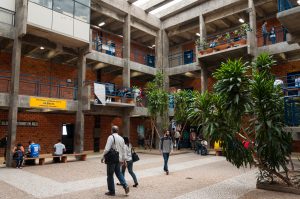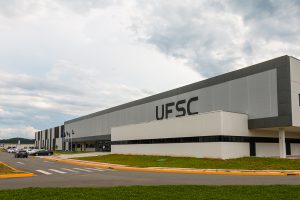Sanitary and Environmental Engineering
 The UFSC Sanitary and Environmental Engineering program offers comprehensive professional training in methodologies and technologies related to the planning, design, construction, operation, maintenance, and management of various systems, including water supply systems, sanitary sewage, urban and industrial solid waste, industrial effluent treatment, stormwater management, urban drainage, applied hydraulics and hydrology, hydraulic-building installations, and water and air pollution control.
The UFSC Sanitary and Environmental Engineering program offers comprehensive professional training in methodologies and technologies related to the planning, design, construction, operation, maintenance, and management of various systems, including water supply systems, sanitary sewage, urban and industrial solid waste, industrial effluent treatment, stormwater management, urban drainage, applied hydraulics and hydrology, hydraulic-building installations, and water and air pollution control.
The program also emphasizes the development of actions for diagnosing and characterizing the environment, monitoring and controlling environmental quality, planning water resources, recovering the environment, and preserving and enhancing environmental quality.
The curriculum is structured into three main areas: basic courses (covering calculus, physics, chemistry, biology, and graphic representation), professional engineering courses, and specific courses related to sanitation and the environment. Additionally, students engage in project courses, develop a final project, and complete 360 hours of supervised internships. Complementary research, outreach, and student tutoring activities further enrich the academic experience.
Career opportunities for sanitary and environmental engineers are robust, supported by the regulation of their professional practice and the increasing societal awareness of sanitary and environmental challenges. There is a growing demand in municipal, state, and federal government bodies, consulting firms, and the industrial sector for professionals with technical competence and adequate training to address technological, managerial, and planning issues in sanitation and environmental fields.
| Program Length: 10 semesters (5 years) |
| Website: ens.paginas.ufsc.br |
| Classes may be held in the morning, afternoon and evening. |





 The Joinville Campus’ Railway and Metro Engineering program is designed to provide a comprehensive technical-scientific and professional education, equipping students with the skills to identify, formulate and solve engineering challenges. The curriculum fosters a systemic approach, enabling graduates to excel in four key areas: mechanical design – rolling stock; electrical-electronic systems design; railway and metro system maintenance, and operations management.
The Joinville Campus’ Railway and Metro Engineering program is designed to provide a comprehensive technical-scientific and professional education, equipping students with the skills to identify, formulate and solve engineering challenges. The curriculum fosters a systemic approach, enabling graduates to excel in four key areas: mechanical design – rolling stock; electrical-electronic systems design; railway and metro system maintenance, and operations management. The UFSC Psychology program was established in 1978 and was the first of its kind in the state of Santa Catarina, boasting extensive experience in teaching, research and outreach. Its comprehensive curriculum equips students with knowledge from various theoretical perspectives, providing a solid foundation for professional practice across diverse areas and fields within the realm of Psychology.
The UFSC Psychology program was established in 1978 and was the first of its kind in the state of Santa Catarina, boasting extensive experience in teaching, research and outreach. Its comprehensive curriculum equips students with knowledge from various theoretical perspectives, providing a solid foundation for professional practice across diverse areas and fields within the realm of Psychology. The Portuguese Language and Literature program aims to train professionals who are both knowledgeable and autonomous, equipped to engage systematically, reflectively, and critically with themes and issues related to linguistic and literary knowledge across diverse contexts of spoken and written communication.
The Portuguese Language and Literature program aims to train professionals who are both knowledgeable and autonomous, equipped to engage systematically, reflectively, and critically with themes and issues related to linguistic and literary knowledge across diverse contexts of spoken and written communication. When applying to the Physics program, applicants must choose between two distinct degree paths: a research-focused bachelor’s degree (bacharelado) or a teaching degree (licenciatura). The first path prepares graduates for careers in research, exploring various physical phenomena at the graduate level, in industries, or in data science. The teaching degree, on the other hand, trains future physics teachers for primary and secondary schools, as well as for non-formal and informal education settings. Each degree path has its own unique curriculum structure.
When applying to the Physics program, applicants must choose between two distinct degree paths: a research-focused bachelor’s degree (bacharelado) or a teaching degree (licenciatura). The first path prepares graduates for careers in research, exploring various physical phenomena at the graduate level, in industries, or in data science. The teaching degree, on the other hand, trains future physics teachers for primary and secondary schools, as well as for non-formal and informal education settings. Each degree path has its own unique curriculum structure. Created in 2010, the Physiotherapy program on the Araranguá Campus was the first health-related degree to be offered by a public institution in the southern region of the State of Santa Catarina. It aims to meet the regional demand for public, free and quality education.
Created in 2010, the Physiotherapy program on the Araranguá Campus was the first health-related degree to be offered by a public institution in the southern region of the State of Santa Catarina. It aims to meet the regional demand for public, free and quality education. The UFSC Pharmacy program equips students with a comprehensive, humanistic, critical, and reflective education, enabling them to work effectively at all levels of health care with scientific and intellectual rigor. Graduates are prepared to engage in activities related to drugs, medicines, and pharmaceutical care, as well as clinical and toxicological analysis, cosmetics, and food, all aimed at improving the health of individuals, families, and communities.
The UFSC Pharmacy program equips students with a comprehensive, humanistic, critical, and reflective education, enabling them to work effectively at all levels of health care with scientific and intellectual rigor. Graduates are prepared to engage in activities related to drugs, medicines, and pharmaceutical care, as well as clinical and toxicological analysis, cosmetics, and food, all aimed at improving the health of individuals, families, and communities. The UFSC Physical Education program aims to qualify professionals for a humanist and ethically responsible practice, with the goal of promoting health and quality of life for all people.
The UFSC Physical Education program aims to qualify professionals for a humanist and ethically responsible practice, with the goal of promoting health and quality of life for all people.